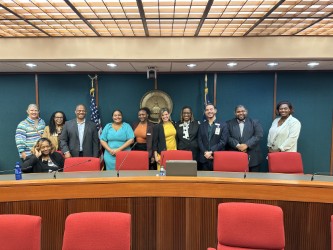Testimony for Georgia AP African American Studies Hearing

Who: Darian Burns, Legislative and Public Policy Analyst, Southern Education Foundation
Re: Public Hearing on AP African American Studies in GA
Date and Time: Thursday, August 8, 2024, 9:00 AM
Where: GA State Captiol, CLOB RM 506
Good Morning all,
Thank you to everyone who organized this space to convene and for the opportunity to provide comments. My name is Darian Burns and I am the Legislative and Public Policy Analyst with the Southern Education Foundation and a proud graduate of Dekalb County Public Schools who wishes I had the opportunity to take AP African American Studies when I was in school. I would like to extend immense gratitude to the students, educators, community members, organizations, and state leaders who fiercely advocated over the past few weeks to ensure that AP African American Studies would be available in its full and rigorous form to all Georgia students. The collective efforts to publicly oppose the superintendent’s decision and apply strategic pressure have been instrumental in achieving the formal approval of the course.
We firmly believe that the decision to officially implement AP African American Studies to the state-funded course catalog with a unique course code was and is the only acceptable resolution.
Nonetheless, the repercussions of the superintendent’s initial inaction persist. Educators, school leaders, and students now face the challenge of implementing the course with the school year underway for many or about to begin. This issue underscores the critical need for improvements in state regulatory processes and decision-making, ensuring they are transparent and seeks input from students, educators, caregivers, and school leaders.
Further, it is alarming that such a convoluted and unnecessary process has been uniquely applied to the AP African American Studies course. This disparity suggests a troubling and unacceptable differential treatment of academic content centered around African American and Black history. It also sends a deeply harmful message to the Black students who make up nearly
40% of students across Georgia’s K-12 public schools implying that academic content focused on Black and African American history and experiences are debatable, not a priority, and subject to great public scrutiny. Such an approach is inconsistent with the state’s duty to serve all students equally.
This situation reinforces SEF’s firm opposition to any “divisive concepts” legislation in Georgia and other states. The recent events have demonstrated that such laws do not serve the best interests of students, educators, or communities. The widespread support for this course among students, educators, and lawmakers, coupled with the course’s proven success in its pilot phase, highlights that the refusal to formally approve this course was not driven by good reason.
At SEF, our mission is to advocate for the advancement of equitable education policies that support Black and Brown students across the South. We remain committed to this mission and oppose any efforts that seek to censor any form of ethnic studies.
Thank you for your time,
Darian Burns
Legislative and Public Policy Analyst Southern Education Foundation
